|
Books Should Be Free Loyal Books Free Public Domain Audiobooks & eBook Downloads |
|
|
Books Should Be Free Loyal Books Free Public Domain Audiobooks & eBook Downloads |
|
Literature |
|---|
|
Book type:
Sort by:
View by:
|
By: Christopher Morley (1890-1957) | |
|---|---|
 Songs for a Little House
Songs for a Little House
| |
 Shandygaff
Shandygaff
A number of most agreeable Inquirendoes upon Life & Letters, interspersed with Short Stories & Skits, the whole most Diverting to the Reader. SHANDYGAFF: a very refreshing drink, being a mixture of bitter ale or beer and ginger-beer, commonly drunk by the lower classes in England, and by strolling tinkers, low church parsons, newspaper men, journalists, and prizefighters. Said to have been invented by Henry VIII as a solace for his matrimonial difficulties. It is believed that a continual bibbing of shandygaff saps the will, the nerves, the resolution, and the finer faculties, but there are those who will abide no other tipple... | |
By: Christopher Pearse Cranch (1813-1892) | |
|---|---|
 The Last of the Huggermuggers
The Last of the Huggermuggers
| |
By: Clair W. Hayes (1887-) | |
|---|---|
 The Boy Allies with Uncle Sam's Cruisers
The Boy Allies with Uncle Sam's Cruisers
| |
By: Clara Barrus (1864-1931) | |
|---|---|
 Our Friend John Burroughs
Our Friend John Burroughs
| |
By: Clara E. Laughlin (1873-1941) | |
|---|---|
 Everybody's Lonesome
Everybody's Lonesome
Twenty-year-old Mary Alice is bored with her home life and envious of the beautiful, poised, popular girls she sees at parties. At her mother's advice, she reluctantly visits her Godmother in New York, who teaches Mary Alice a little homemade "magic" and the one great Secret that will put her at ease with other people. How can Mary Alice learn to use these gifts to bring happiness into her own life and other lives? Although this charming novelette is subtitled "A True Fairy Story," it reveals that most of the "magic" in life can be found within ourselves. (Introduction by Jan MacGillivray) | |
By: Clara Louise Burnham (1854-1927) | |
|---|---|
 In Apple-Blossom Time A Fairy-Tale to Date
In Apple-Blossom Time A Fairy-Tale to Date
| |
 Jewel
Jewel
| |
 The Opened Shutters
The Opened Shutters
| |
By: Clara Reeve (1729-1807) | |
|---|---|
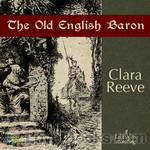 The Old English Baron
The Old English Baron
The story follows the adventures of Sir Philip Harclay, who returns to medieval England to find that the castle seat and estate of his friend Lord Lovel have been usurped. A series of revelations, horrors and betrayals climax in a scene of single combat in which good battles evil for the return of the prize. | |
By: Clara Viebig (1860-1952) | |
|---|---|
 Absolution
Absolution
| |
 The Son of His Mother
The Son of His Mother
| |
By: Clarence Budington Kelland (1881-1964) | |
|---|---|
 Youth Challenges
Youth Challenges
| |
By: Clarence Day (1874-1935) | |
|---|---|
 This Simian World
This Simian World
| |
By: Clarence Day, Jr. (1874-1935) | |
|---|---|
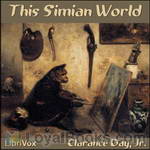 This Simian World
This Simian World
Clarence Day, Jr., best known for his work Life with Father, presents a satirical speculation on how the world might be different if we apes had not risen to prominence, but rather one of the other species had become dominant in our place. | |
By: Clarence Edward Mulford (1883-1956) | |
|---|---|
 Bar-20 Days
Bar-20 Days
| |
By: Clarence Stratton (1880-1951) | |
|---|---|
 Public Speaking
Public Speaking
| |
By: Clarence Young | |
|---|---|
 Jack Ranger's Western Trip Or, from Boarding School to Ranch and Range
Jack Ranger's Western Trip Or, from Boarding School to Ranch and Range
| |
 The Motor Boys on the Pacific Or, the Young Derelict Hunters
The Motor Boys on the Pacific Or, the Young Derelict Hunters
| |
By: Claude Prosper Jolyot de Crébillon (1707-1777) | |
|---|---|
 The Amours of Zeokinizul, King of the Kofirans Translated from the Arabic of the famous Traveller Krinelbol
The Amours of Zeokinizul, King of the Kofirans Translated from the Arabic of the famous Traveller Krinelbol
| |
By: Clayton Meeker Hamilton (1881-1946) | |
|---|---|
 A Manual of the Art of Fiction
A Manual of the Art of Fiction
| |
 Materials and Methods of Fiction With an Introduction by Brander Matthews
Materials and Methods of Fiction With an Introduction by Brander Matthews
| |
By: Clement King Shorter (1857-1926) | |
|---|---|
 Charlotte Brontë and Her Circle
Charlotte Brontë and Her Circle
| |
 George Borrow and His Circle Wherein May Be Found Many Hitherto Unpublished Letters Of Borrow And His Friends
George Borrow and His Circle Wherein May Be Found Many Hitherto Unpublished Letters Of Borrow And His Friends
| |
 Immortal Memories
Immortal Memories
| |
By: Cleveland Moffett (1863-1926) | |
|---|---|
 Through the Wall
Through the Wall
| |
 The Conquest of America A Romance of Disaster and Victory: U.S.A., 1921 A.D.
The Conquest of America A Romance of Disaster and Victory: U.S.A., 1921 A.D.
| |
 Possessed
Possessed
| |
By: Clifford D. Simak (1904-1988) | |
|---|---|
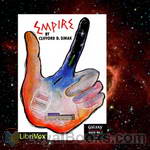 Empire
Empire
In a future time, the solar system is powered by one energy source, controlled by one huge organisation, which has plans to use this control to dominate the planets. Unknown to them, a couple of maverick scientists accidentally develop a completely new form of energy supply and threaten the corporation's monopoly. Naturally, the corporation can't allow this to happen... A stunning story about the manipulation of pure energy, climaxing in interstellar conflict. | |
 The Street That Wasn't There
The Street That Wasn't There
| |
By: Clifford Simak (1904-1988) | |
|---|---|
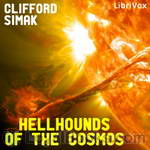 Hellhounds of the Cosmos
Hellhounds of the Cosmos
From Astounding Stories of 1932. Earth is being attacked by horrible black monsters that appear from nowhere and destroy and kill everything and everyone in their paths. Nothing affects them, nothing stops them; they are impervious to all weapons. Earth is doomed. But there is one hope and it rests on the shoulders of 98 brave men. Can they do it? can they find a way of retaliating? Listen and find out. | |
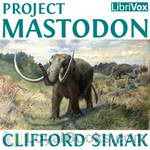 Project Mastodon
Project Mastodon
Clifford Simak deals with the implications of time travel in his own unique way in this story. What if a group of guys did it on their own, without any help from government or industry? On a shoestring,so to speak? Would anyone believe them? What would you do if you could go back 150,000 years to a time when mastodons and saber toothed tigers roamed North America? And what happens when they run out of money? All these questions are explored in the usual humorous, wry Simak way in this story. | |
By: Clinton Scollard (1860-1932) | |
|---|---|
 Sprays of Shamrock
Sprays of Shamrock
| |
 From the Lips of the Sea
From the Lips of the Sea
| |
By: Clyde Fitch (1865-1909) | |
|---|---|
 The Girl with the Green Eyes A Play in Four Acts
The Girl with the Green Eyes A Play in Four Acts
| |
 The Smart Set Correspondence & Conversations
The Smart Set Correspondence & Conversations
| |
 The Climbers A Play in Four Acts
The Climbers A Play in Four Acts
| |
By: Colin Munro | |
|---|---|
 Fern Vale (Volume 1) or the Queensland Squatter
Fern Vale (Volume 1) or the Queensland Squatter
| |
By: Confucius (551 BCE-479 BCE) | |
|---|---|
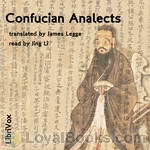 Confucian Analects
Confucian Analects
The Analects, or Lunyu (simplified Chinese: 论语; traditional Chinese: 論語; pinyin: Lún Yǔ; literally "Classified/Ordered Sayings"), also known as the Analects of Confucius, are considered a record of the words and acts of the central Chinese thinker and philosopher Confucius and his disciples, as well as the discussions they held. Written during the Spring and Autumn Period through the Warring States Period (ca. 475 BC - 221 BC), the Analects is the representative work of Confucianism and continues to have a substantial influence on Chinese and East Asian thought and values today... | |
By: Coningsby Dawson (1883-1959) | |
|---|---|
 Murder Point A Tale of Keewatin
Murder Point A Tale of Keewatin
| |
 The Kingdom Round the Corner A Novel
The Kingdom Round the Corner A Novel
| |
By: Conrad Aiken (1889-1973) | |
|---|---|
 American Poetry, 1922 A Miscellany
American Poetry, 1922 A Miscellany
| |
 House of Dust: A Symphony
House of Dust: A Symphony
The House of Dust is a poem written in the four-movement format of a classical symphony. Hauntingly beautiful despite its bleak post-World War I depictions of human mortality and loss, the poem develops its movements around central images such as Japanese ukiyo-e ("floating world") woodblock prints, touching the reader's senses with endlessly evocative allusions to wind, sea, and weather. In this underlying Japanese sensibility and dependence on central perceptual images, Aiken's poem is similar to poetry of Imagists of the time such as Amy Lowell. Also deeply influenced by the concepts of modern psychology, Aiken delved deeply into individual human identity and emotion. | |
By: Constance D'Arcy Mackay (1887?-1966) | |
|---|---|
 Patriotic Plays and Pageants for Young People
Patriotic Plays and Pageants for Young People
| |
By: Constance Fenimore Woolson (1840-1894) | |
|---|---|
 The Old Stone House
The Old Stone House
| |
By: Cordenio A. Severance (1863?-1925) | |
|---|---|
 Indian Legends of Minnesota
Indian Legends of Minnesota
| |
By: Cornelia Meigs (1884-1973) | |
|---|---|
 The Windy Hill
The Windy Hill
When two children come to stay with their cousin, they immediately realize something is wrong, but no one will tell them what. Their cousin is strangely altered: nervous, preoccupied, hardly aware of their existence. They soon discover that a conflict is brewing among the hills and farms of the Medford Valley, one whose origins reach back over a century. They must piece it together from scattered clues, and from the stories told to them by a mysterious bee keeper and his daughter. This 1922 Newbery Honor Book tells of the traits that run in a family—honor, stubborn pride, and a dark lust for wealth—and how they shape the destinies of three generations. (Introduction by Peter Eastman) | |
By: Cornelius Weygandt (1871-1957) | |
|---|---|
 Irish Plays and Playwrights
Irish Plays and Playwrights
| |
By: Corra Harris (1869-1935) | |
|---|---|
 A Circuit Rider's Wife
A Circuit Rider's Wife
| |
 The Jessica Letters: An Editor's Romance
The Jessica Letters: An Editor's Romance
| |
By: Cosmo Hamilton (1879-1942) | |
|---|---|
 Who Cares? a story of adolescence
Who Cares? a story of adolescence
| |
By: Cotton Noe (1864-1953) | |
|---|---|
 The Loom of Life
The Loom of Life
| |
By: Courtney Ryley Cooper (1886-1940) | |
|---|---|
 The Cross-Cut
The Cross-Cut
| |
 The White Desert
The White Desert
| |
By: Coventry Kersey Dighton Patmore (1823-1896) | |
|---|---|
 Angel in the House
Angel in the House
| |
 Victories of Love
Victories of Love
| |
 The Children's Garland from the Best Poets
The Children's Garland from the Best Poets
| |
By: Covington Clarke | |
|---|---|
 Aces Up
Aces Up
A crack American flying troop has been sent to France, where they await further instructions. They are concerned that their extensive talents will not be put to good use in the war. Major Cowan introduces Lt. McGee as the British instructor for the crew. It turns out the Brit is actually an American, born in the U.S., even though his parents were British. McGee and Larkin are flying partners. Out on a mission, McGee spots a small enemy plane in a searchlight, probably intent on dropping flares to mark targets for bombers... | |
By: Credo Fitch Harris (1874-1956) | |
|---|---|
 Sunlight Patch
Sunlight Patch
| |
 Where the Souls of Men are Calling
Where the Souls of Men are Calling
| |
 Wings of the Wind
Wings of the Wind
| |
By: Cuthbert Bede (1827-1889) | |
|---|---|
 Adventures of Mr. Verdant Green
Adventures of Mr. Verdant Green
| |
By: Cy Warman (1855-1914) | |
|---|---|
 The Last Spike And Other Railroad Stories
The Last Spike And Other Railroad Stories
| |
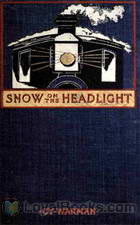 Snow on the Headlight A Story of the Great Burlington Strike
Snow on the Headlight A Story of the Great Burlington Strike
| |
By: Cynthia Stockley (1883-1936) | |
|---|---|
 Blue Aloes Stories of South Africa
Blue Aloes Stories of South Africa
| |
By: D. H. Lawrence (1885-1930) | |
|---|---|
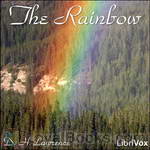 The Rainbow
The Rainbow
Set against the backdrop of a rapidly industrializing England, the bewildering shift in social structure, the fading away of traditions and the advent of new ways of life, The Rainbow by DH Lawrence depicts how one family's story becomes the story of a society. Originally planned as a novel titled The Sisters, Lawrence finally split the theme into two separate novels after many revisions and rewrites. The Rainbow is the first novel in the Brangwen family saga. Tom Brangwen is a small time farmer in rural Nottinghamshire... | |
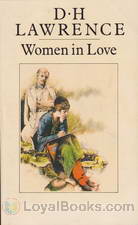 Women in Love
Women in Love
If you have read DH Lawrence's The Rainbow, you'd certainly want to read the sequel, Women in Love. Published in 1920, the two books were originally meant to be a single work, spanning several generations of the Brangwen family, especially the women. However, a complicated publishing history, delays and editorial revisions, followed by the hostile reception and controversies that faced The Rainbow led to a gap of five years between the two books. Yet, by 21st century standards, Women in Love seems almost tame, and modern-day readers may well be bewildered by the amount of criticism it generated among the custodians of morals in an earlier age... | |
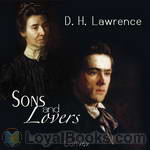 Sons and Lovers
Sons and Lovers
This intimate portrait of a coal-miner’s family fastens on each member in turn: Walter Morel, the collier; Gertrude, his wife; and the children: William, Annie, Arthur, and Paul. When Mrs. Morel begins to be estranged from her husband because of his poor financial sense and his drinking habits, she comes to inhabit the lives of her children – most particularly, her sons. She is determined that they will grow to be something more than men that come home blackened with coal dust every day and roaring with drink every night... | |
 Aaron's Rod
Aaron's Rod
Flutist Aaron Sisson is caught up in the aftermath of WWI. A lost soul, he attempts to find himself in the comfort of bar-room talk and alcohol and a woman. Moving on, he spends time with a mining executive's relatives. But he finds the family a stuffy middle-class lot, bored with each other and themselves. He leaves his wife and children and strikes out for the open road. During a playing engagement at an opera performance, he reunites with the mining executive's family. Talk is of love and war, none of it very satisfying to anyone... | |
 Lost Girl
Lost Girl
"There is no mistake about it, Alvina was a lost girl. She was cut off from everything she belonged to." In this most under-valued of his novels, Lawrence once again presents us with a young woman hemmed in by her middle-class upbringing and (like Ursula Brangwen in The Rainbow) longing for escape. Alvina Houghton's plight, however, is given a rather comic and even picaresque treatment. Losing first her mother, a perpetual invalid, and later her cross-dressing father, a woefully ineffectual small-scale entrepreneur, Alvina feels doomed to merge with the tribe of eternal spinsters who surround her in the dreary mining community of Woodhouse... | |
 The Prussian Officer
The Prussian Officer
| |
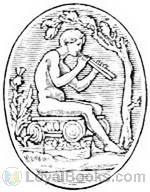 Ballad of Another Ophelia
Ballad of Another Ophelia
LibriVox volunteers bring you 16 recordings of the haunting Ballad of Another Ophelia by D. H. Lawrence. This was the Fortnightly Poetry project for March 24, 2013. | |
 Look! We Have Come Through!
Look! We Have Come Through!
| |
 New Poems
New Poems
| |
 Bay A Book of Poems
Bay A Book of Poems
| |
 Wintry Peacock
Wintry Peacock
| |
By: D. H. Parry | |
|---|---|
 With Haig on the Somme
With Haig on the Somme
| |
By: D. M. (David Macbeth) Moir (1798-1851) | |
|---|---|
 The Life of Mansie Wauch tailor in Dalkeith
The Life of Mansie Wauch tailor in Dalkeith
| |
 The Life of Mansie Wauch Tailor in Dalkeith, written by himself
The Life of Mansie Wauch Tailor in Dalkeith, written by himself
| |
By: D. R. (David Russell) McAnally (1847-1909) | |
|---|---|
 Irish Wonders The Ghosts, Giants, Pooka, Demons, Leprechawns, Banshees, Fairies, Witches, Widows, Old Maids, and other Marvels of the Emerald Isle
Irish Wonders The Ghosts, Giants, Pooka, Demons, Leprechawns, Banshees, Fairies, Witches, Widows, Old Maids, and other Marvels of the Emerald Isle
| |
By: D. Torbett | |
|---|---|
 The Canadian Photoplay title of The Land of Promise
The Canadian Photoplay title of The Land of Promise
| |
By: D. W. (David W.) Belisle | |
|---|---|
 The American Family Robinson or, The Adventures of a Family lost in the Great Desert of the West
The American Family Robinson or, The Adventures of a Family lost in the Great Desert of the West
| |
By: Daisy Ashford (1881-1972) | |
|---|---|
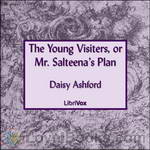 The Young Visiters, or Mr. Salteena's Plan
The Young Visiters, or Mr. Salteena's Plan
The Young Visiters is a comic romance novella that parodies upper class society of late Victorian England. Social climber Alfred Salteena introduces his young lady friend Ethel to a genuine gentleman named Bernard and, to his irritation, they hit it off. But Bernard helps Alfred in his plan to become a gentleman, which, Alfred hopes, will help him win back Ethel. | |
 Daisy Ashford: Her Book
Daisy Ashford: Her Book
| |
By: Dallas Lore Sharp (1870-1929) | |
|---|---|
 The Hills of Hingham
The Hills of Hingham
| |
By: Dallas McCord Reynolds (1917-1983) | |
|---|---|
 Status Quo
Status Quo
Larry Woolford is a government agent, tasked with investigating subversive activity. He does everything an ambitious young man should do if he wants to succeed: wear the right clothes, listen to the right music, even drink vodka martinis. Then he stumbles across a conspiracy of Weirds plotting to overthow the entire existing social order. It's a race against time. Can he stop their fiendish plan, and keep America safe for shallow judgements based on status symbols? Status Quo was nominated for the 1962 Hugo Award for short fiction. | |
By: Dame Rose Macaulay (1881-1958) | |
|---|---|
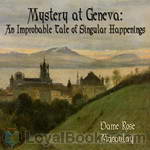 Mystery at Geneva: An Improbable Tale of Singular Happenings
Mystery at Geneva: An Improbable Tale of Singular Happenings
Henry Beechtree, a newspaper correspondent for the British Bolshevist, is covering the latest otherwise sleepy session of the League of Nations in Geneva, when the newly elected President – a member of the Norwegian delegation – disappears mysteriously, adding some badly needed ‘spice’ to Henry's assignment. (Introduction by Cathy Barratt) | |
By: Damon Francis Knight (1922-2002) | |
|---|---|
 The Worshippers
The Worshippers
| |
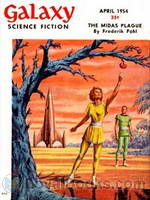 Special Delivery
Special Delivery
| |
By: Dana Gatlin | |
|---|---|
 Missy
Missy
| |
By: Dane Coolidge (1873-1940) | |
|---|---|
 Shadow Mountain
Shadow Mountain
| |
 Silver and Gold A Story of Luck and Love in a Western Mining Camp
Silver and Gold A Story of Luck and Love in a Western Mining Camp
| |
 Hidden Water
Hidden Water
| |
 Rimrock Jones
Rimrock Jones
| |
 Wunpost
Wunpost
| |
By: Daniel Bussier Shumway (1868-) | |
|---|---|
 The Nibelungenlied
The Nibelungenlied
| |